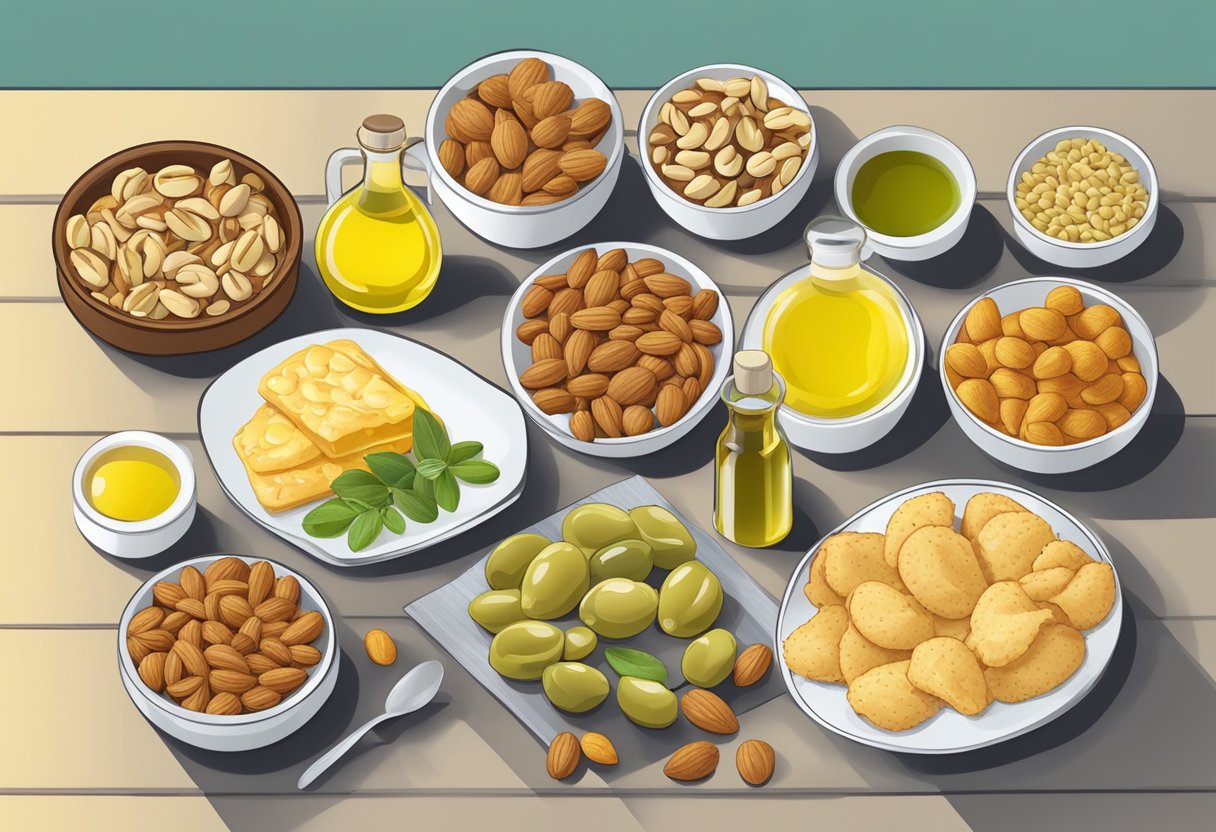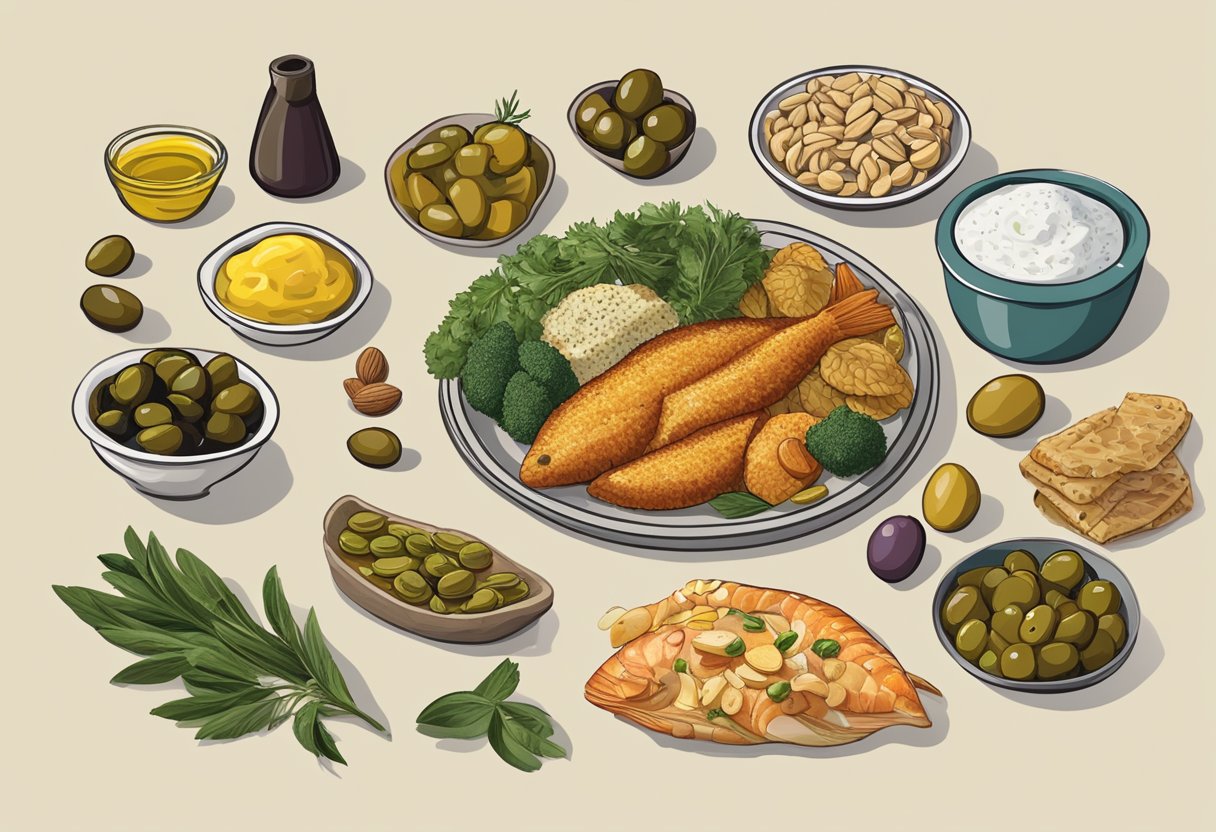Fats play a crucial role in nutrition and overall health, with a distinction that has been well-established between healthy and unhealthy fats. The Mediterranean diet, often commended for its beneficial impact on health outcomes, particularly heart disease and type 2 diabetes, leans heavily on the consumption of healthy fats.
These fats, such as monounsaturated and polyunsaturated fats, are pivotal in promoting cardiovascular health. In contrast, the diet minimizes intake of unhealthy saturated and trans fats, which are linked to negative health effects.

Adherence to a Mediterranean diet, rich in foods like olive oil, nuts, and fish, provides a practical template for incorporating these heart-healthy fats into daily meals. While the diet focuses on the inclusion of beneficial fats, it also implicitly reduces foods high in unhealthy fats, which can exacerbate the risk of cardiovascular disease and type 2 diabetes.
This eating pattern underscores the importance of balance and quality of fats consumed rather than total fat elimination.
Key Takeaways
- The Mediterranean diet emphasizes the consumption of healthy fats to promote heart health.
- Unhealthy saturated and trans fats are limited to reduce the risk of chronic diseases.
- This dietary approach serves as a guideline for integrating beneficial fats into everyday eating.
Table of Contents
Understanding Fats
Fats play crucial roles in the body, but it’s important to distinguish between their different types and effects on health.
Classification of Fats
Fats are primarily classified into saturated, unsaturated, and trans fats. Saturated fats are solid at room temperature and are typically found in animal products. They include butter, cheese, and certain meat cuts. Unsaturated fats are usually liquid at room temperature and can be further divided into monounsaturated and polyunsaturated fats. Monounsaturated fats are present in olive oil and avocados, while polyunsaturated fats are abundant in fish, nuts, and certain oils, rich in omega-3 fatty acids.
Chemical Structure and Sources
The chemical structure of fatty acids determines their classification. Saturated fatty acids have no double bonds in their structure, making them more stable and less prone to oxidation. Unsaturated fatty acids include monounsaturated fats (one double bond) and polyunsaturated fats (multiple double bonds). These structures are found in plant-based oils and seafood, aligning with the Mediterranean diet’s focus on plant-derived fats and fatty fish.
Effects of Fats on Health
Fats influence health in various ways. Saturated fats and trans fats are associated with higher LDL (low-density lipoprotein) cholesterol levels, which can lead to clogged arteries and a higher risk of heart disease and stroke. Conversely, monounsaturated and polyunsaturated fats can help raise HDL (high-density lipoprotein) cholesterol and reduce inflammation and blood pressure. The Mediterranean diet emphasizes the intake of healthy fats to improve cardiovascular health.
The Mediterranean Diet Overview
The Mediterranean Diet emphasizes nutritious fats and whole foods, with a focus on plant-based ingredients and a balance of other food groups.
Key Components of the Mediterranean Diet
- Olive Oil: A cornerstone of the Mediterranean diet, which replaces other dietary fats like butter.
- Fruits and Vegetables: Abundant in this diet, providing antioxidants, fiber, and essential vitamins.
- Nuts and Seeds: A source of healthy fats, protein, and fiber.
- Fish and Seafood: Encouraged at least twice a week as a primary protein source, rich in omega-3 fatty acids.
- Whole Grains: Integral for fiber intake; gluten-free options include quinoa, brown rice, and millet.
- Moderate Wine Consumption: Often paired with meals, with an emphasis on red wine, in moderation.
Mediterranean Dietary Patterns
- Healthy Diet: One that consists of a high intake of olive oil, fruits, vegetables, whole grains, nuts, and seeds; moderate intake of fish and poultry; low intake of dairy products, red meat, processed meats, and sweets; and a focus on gluten-free whole grains for those with a gluten intolerance.
- Regular Physical Activity and Portion Control: Both are vital practices within the Mediterranean lifestyle for maintaining a healthy weight and overall well-being.
- Dietary Fat: Contrary to many modern diets that promote low-fat intake, the Mediterranean diet appreciates the value of healthy fats, advocating for moderation rather than elimination.
Impact of Dietary Fats on Health Outcomes

The type and quantity of dietary fats one consumes have significant implications for health, particularly within a Mediterranean framework, where heart-healthy fats from sources like olive oil, nuts, and fatty fish are staples.
Role of Healthy Fats in Disease Prevention
Healthy fats, commonly found in foods such as avocado, salmon, mackerel, sardines, and various nuts, play a crucial role in the prevention of chronic diseases. These fats are associated with a lower cardiovascular risk. For instance, the monounsaturated fats in avocados are linked to reduced heart disease and stroke incidence. Likewise, the omega-3 fatty acids present in fatty fish like salmon, mackerel, and sardines are recognized for their ability to lower high blood pressure and have been correlated with a reduced risk of type 2 diabetes.
- Avocado: Known for its monounsaturated fats that support heart health.
- Nuts: A source of both monounsaturated and polyunsaturated fats, nuts play a role in maintaining healthy cholesterol levels.
- Fatty fish: Salmon, mackerel, and sardines provide omega-3 fatty acids, vital for cognitive function and cardiovascular health.
Consequences of Excessive Unhealthy Fats
Conversely, diets high in unhealthy fats, namely trans fats and saturated fats, are linked with negative health outcomes. Regular consumption of these fats can lead to weight gain and insulin resistance, which are risk factors for type 2 diabetes and heart disease. Trans fats, in particular, are known to adversely affect lipid profiles, leading to an increase in harmful LDL cholesterol and a decrease in beneficial HDL cholesterol.
- Trans fats: Often found in processed foods, increase LDL cholesterol, and reduce HDL cholesterol, heightening the risk of heart diseases.
- Saturated fats: Commonly found in animal products and certain oils, can contribute to the development of cardiovascular diseases if consumed in excess.
Healthy Fats in the Mediterranean Diet
The Mediterranean Diet emphasizes the inclusion of healthy fats, particularly those beneficial to cardiovascular health. One can find these fats in various foods integral to the diet.
Monounsaturated Fats and Olive Oil
Monounsaturated fats are a cornerstone of the Mediterranean diet, with olive oil as its primary source. This type of fat is known to support heart health. Olive oil, especially extra-virgin olive oil, is rich in antioxidants and can positively affect cholesterol levels. It’s commonly used in cooking, dressings, and dips. Other sources of monounsaturated fats include nuts—such as almonds and cashews—as well as avocados and peanut oil, offering both variety and versatility in a gluten-free Mediterranean dietary pattern.
Polyunsaturated Fats and Omega-3s
Polyunsaturated fats include omega-3 fatty acids, which are essential for the brain and body. The Mediterranean diet encourages the consumption of omega-3 fatty acids through fish, particularly fatty fish like salmon and mackerel. For those on a gluten-free diet, fish offers a source of protein and essential fatty acids without the gluten found in many other protein sources. Flaxseeds and walnuts are excellent plant-based sources of polyunsaturated fats and fit well within the diet, enhancing its cardiac benefits.
Unhealthy Fats and Foods to Limit

When adopting a Mediterranean diet, it’s crucial to understand which foods contain unhealthy fats, such as saturated and trans fats, to limit their intake.
Recognizing Sources of Saturated and Trans Fats
Saturated and trans fats are mostly found in animal products and certain oils. Butter, cheese, and whole milk are dairy products high in saturated fats. Processed and red meats contribute both saturated fats and, in some instances, trans fats. Margarine, often touted as a butter alternative, can contain trans fats unless it’s specifically labeled as trans-fat-free. Additionally, baked goods and fried foods frequently contain these unhealthy fats due to the oils used in their preparation. Individuals following a gluten-free Mediterranean diet should be especially cautious, as some gluten-free products may have higher fat content to compensate for texture and flavor.
The Debate Over Dairy and Red Meat
Dairy products and red meat are staples in many diets but are often highlighted for their saturated fat content. In a gluten-free Mediterranean diet, moderation is key. For instance, cheese can be enjoyed in small amounts. Red meat should be limited, with a focus on lean cuts when consumed, and it’s advisable to prioritize poultry or fish instead. Processed meats are best avoided due to their associated health risks, including higher saturated fat levels and potential gluten-containing additives. The use of cream in recipes can be minimized by substituting with healthier alternatives, such as olive oil or yogurt, to align with a Mediterranean dietary pattern.
Research and Recommendations
This section delves into empirical data and expert guidelines that inform decisions about fat consumption, particularly within a gluten-free Mediterranean diet framework.
Scientific Evidence on Fats and Health
Meta-analyses and numerous studies underscore the importance of differentiating between healthy and unhealthy fats in one’s diet. Research published in key journals indicates that monounsaturated and polyunsaturated fats—common in the Mediterranean diet—contribute to improved cardiovascular health. For example, a comprehensive study highlighted in the National Center for Biotechnology Information supports the idea that these fats can lower bad cholesterol levels.
Conversely, saturated fats and trans fats are consistently linked with adverse health outcomes, and organizations such as the American Heart Association advocate for their reduction. Evidence suggests that a diet high in these unhealthy fats correlates with an increased risk of heart disease.
Guidelines for Fat Intake
When considering dietary recommendations, the World Health Organization suggests that fats should not exceed 30% of total energy intake to avoid unhealthy weight gain. In the context of a gluten-free Mediterranean diet, one should focus on a balanced diet with fats primarily derived from sources like olive oil, nuts, and fish, thus achieving moderation in fat consumption.
For those with gluten sensitivities, embracing the Mediterranean diet’s emphasis on fruits, vegetables, and proteins, while avoiding traditional grain-based staples, aligns with current guidance. To adhere to this dietary pattern and maintain gluten-free integrity, individuals should avoid gluten-containing whole grains and instead include gluten-free alternatives such as quinoa and brown rice.
Practical Tips for Following a Mediterranean Diet

When adopting a Mediterranean diet, it’s crucial to emphasize the intake of healthy fats, predominantly from plant sources, which are a cornerstone of this dietary pattern.
Incorporating More Healthy Fats
Olive Oil: A staple in the Mediterranean diet, individuals should utilize extra-virgin olive oil as their main cooking fat and as a salad dressing base, due to its high content of monounsaturated fats and antioxidants. It can be a gluten-free alternative for flavoring a variety of dishes.
Nuts and Seeds: A handful of nuts like almonds, walnuts, or pistachios can be a nutritious snack providing essential fats, protein, and fiber. Chia seeds and flaxseeds are excellent for adding omega-3 fatty acids to meals, such as in gluten-free breads or as salad toppings.
Avocado: Rich in monounsaturated fats, avocados can be incorporated into the Mediterranean diet as a creamy addition to salads, spreads for gluten-free toasts, or to make dressings creamier without gluten-containing thickeners.
To ensure the diet remains gluten-free, always check labels on packaged nut and seed products for potential gluten cross-contamination. Each of these foods contributes to the good fats necessary for heart health and overall well-being, aligning with the nutritional principles of the Mediterranean diet.
Frequently Asked Questions

In a gluten-free Mediterranean diet, the types of fats consumed are key to understanding its health benefits. Individuals often question what fats are involved and how they can implement them effectively.
What types of fats are primarily consumed in a Mediterranean diet?
The Mediterranean diet emphasizes the intake of healthy fats, such as monounsaturated fats found in olive oil, nuts, and avocados, as well as polyunsaturated fats from fatty fish and seeds.
How does the fat content in the Mediterranean diet contribute to its health benefits?
Fats in the Mediterranean diet are mainly unsaturated, which helps maintain heart health and supports balanced inflammation levels, contributing to reduced risks of chronic diseases.
Which fats should be limited or avoided to adhere to a Mediterranean eating pattern?
It is advised to limit saturated fats from red meats and high-fat dairy and to avoid trans fats found in processed foods, aligning with the principles of a gluten-free Mediterranean diet.
How can one incorporate healthy fats into meals while following a Mediterranean diet?
To incorporate healthy fats, use olive oil for cooking and dressing, enjoy a handful of unsalted nuts for a snack, and include fatty fish, like salmon, in meal plans multiple times a week.
Are there any specific recommendations regarding omega-3 and omega-6 fatty acid intake in the Mediterranean diet?
While there are no strict guidelines, the diet naturally provides a balance of omega-3s from fish and omega-6s from seeds and nuts; focusing on these sources will ensure a healthy ratio of these essential fatty acids.
What role do monounsaturated fats play in the Mediterranean diet’s nutritional profile?
Monounsaturated fats, especially from olive oil, play a central role by providing energy, supporting cell growth, and helping the body absorb essential fat-soluble vitamins.



